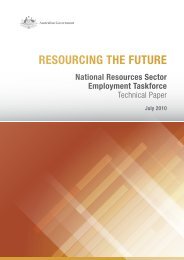Epidemics in a Changing World - Department of Innovation, Industry ...
Epidemics in a Changing World - Department of Innovation, Industry ...
Epidemics in a Changing World - Department of Innovation, Industry ...
Create successful ePaper yourself
Turn your PDF publications into a flip-book with our unique Google optimized e-Paper software.
Many <strong>of</strong> these are completely new <strong>in</strong>fectious agents and their appearance was unexpected.<br />
Figure 3 depicts viruses that have been recently discovered. An example <strong>of</strong> a recently emergent<br />
virus is provided <strong>in</strong> Text Box 2.<br />
EpidemICs <strong>in</strong> a Chang<strong>in</strong>g <strong>World</strong><br />
Report <strong>of</strong> the Expert Work<strong>in</strong>g Group<br />
4<br />
Figure 3: Emergent viruses identified s<strong>in</strong>ce 1994<br />
Source: John Mackenzie (pers.comm.)<br />
Text Box 2: SARS – unexpected and unknown<br />
SARS was the first severe and readily transmissible new human disease to emerge <strong>in</strong><br />
the 21st century. Initially recognised as a global pandemic threat <strong>in</strong> mid March, 2003,<br />
SARS was successfully conta<strong>in</strong>ed <strong>in</strong> less than four months, largely because <strong>of</strong> an<br />
unprecedented level <strong>of</strong> <strong>in</strong>ternational collaboration and cooperation. However, those<br />
four months were characterised by economic and health system chaos <strong>in</strong> a number<br />
<strong>of</strong> affected countries, particularly <strong>in</strong> the Asian region. Of 8000 cases, 774 deaths were<br />
reported from 39 countries.<br />
The cause <strong>of</strong> the disease was <strong>in</strong>itially unknown; tests for all known <strong>in</strong>fectious agents<br />
were negative. The <strong>World</strong> Health Organization (WHO) established a series <strong>of</strong> virtual<br />
networks <strong>of</strong> specialists to discuss epidemiological, cl<strong>in</strong>ical, laboratory, and other<br />
aspects <strong>of</strong> the outbreak. Through this system, a previously unrecognised coronavirus<br />
was discovered as the cause, and transmission was found to occur only after several<br />
days <strong>of</strong> illness, through <strong>in</strong>halation <strong>of</strong> large droplets. It then proved relatively simple to<br />
conta<strong>in</strong> the outbreak through good <strong>in</strong>fection control practices.<br />
(John Mackenzie, pers.comm.)
















